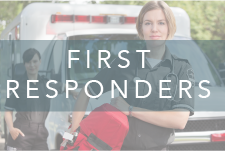How the Stress of First Responders Affects the Whole Family
- Feb 15, 2022
- 6 min read
Updated: Oct 31, 2025

The unique pressures faced by first responders don't end when their shift does. The intense stress and trauma they experience on the job can significantly impact their families, affecting relationships, emotional well-being, and daily life at home. This can lead to a pervasive sense of anxiety and vicarious trauma for loved ones.
How does a first responder’s job impact their family?
A first responder's high-stress job can lead to a unique set of challenges for their family. This includes constant worry for their loved one's safety, feelings of isolation due to long shifts, and the risk of vicarious trauma from hearing about difficult on-the-job experiences.
Want to know more about how to address these challenges and support the families of first responders? Continue reading for a deeper look into the effects of this stress and discover actionable steps to keep the entire family healthy and resilient.
First Responders Stress Affect Family: What You Need to Know
First responders are on the front lines of duty. Their service to their communities and loved ones is often championed for its bravery and selflessness. However, such a line of work comes with intense stress.
First responders are regularly exposed to some of the most harrowing and dangerous scenarios imaginable. They are then asked to return to the field and face those challenges repeatedly. Stress, trauma, and anxiety are common experiences in this line of work, and over time, these can take a toll not only on the individual but also on those closest to them.
It’s important to recognize how First Responders Stress Affect Family, influencing relationships, emotional well-being, and everyday life at home.
However, this stress is not an isolated experience, and the families of first responders face their own traumas and stresses each day. The stress of being a first responder can bleed into one's family, and it is important to acknowledge these stresses to maintain a healthy family.
The Silence of First Responder Families
For many, celebrations and discourse around first responders are relegated to those on the front lines themselves. While this dialogue is certainly important, it is equally as important to consider the experience and vicarious trauma that the families of first responders may face.
Stress, loss, and uncertainty plague not just those on the front lines, but the husbands, wives, and children at home. Providing a voice and care to first responders and their families is crucial for providing effective support to those who care for and protect the community.
The Unique Stress on First Responders' Families
The stress that the families of first responders face is a unique brand. As first responders tend to have long shifts, it is common that families will go without seeing or meaningfully interacting with these members of their family for extended periods of time, which has its negative effects. Not only will those in the field feel isolated in their stresses, but those at home may also be forced to wallow in their uncertainty until their loved one comes home.
However, this uncertainty is just the beginning of the stresses first responders' families can face. Having a loved one on the front lines of disaster can put a new tone to news of high-risk scenarios and natural disasters. Families may constantly worry and stress over the danger their loved ones may be facing.
They may feel the stress and anxiety of the situation through their concerns for their loved one's safety. This constant state of worry is incredibly taxing on one's mental and emotional health, creating a pervasive sense of anxiety, stress, and panic that can dictate one's life. Knowing a loved one may face life-threatening danger each day they put on a uniform is incredibly stressful.
Lastly, families of first responders are also at an increased risk of vicarious trauma. Not only do families view negative news outlets with a more personal frame of reference, but these families may also continue to hear about the difficulties a loved one faced on the job when they return home. Discussing on-the-job traumas can be extraordinarily difficult for families to process.
However, without an opportunity to process these experiences, first responders themselves may be at an increased risk for building traumas and feelings of isolation. This then can create a very delicate and difficult familial dynamic.
First Responders Stress Affect Family: Keeping the Family Healthy
Familial health is both more difficult and more important when at least one of its members is a first responder. Making active efforts to maintain a healthy family dynamic is crucial for everyone's mental and emotional health. Finding a way to talk about stresses is important, just as it is also important to moderate how to discuss these stresses.
Dedicating time for these topics to be discussed, without forcing first responders to open up about an event if they are not ready to, is important. Setting a dedicated time each day or week can help to provide the necessary feeling of safety and stress. Doing so can also allow the families of first responders their own opportunities for mental respite.
Setting aside time each week for family activities can also keep the family and the stresses of the workplace separate. Taking a trip to the movies, mini-golf, or having a nice dinner out can all create a healthy outlet for families to engage in their own traditions and companionship without the interference of potentially traumatic talk.

Find Dedicated Family Counseling
Trauma, PTSD, stress, and more are all common for first responders and their families. Finding a dedicated first responder program or support groups for families of first responders is essential. Waiting until symptoms of PTSD and trauma have already manifested can complicate the recovery process. Establishing these outlets as early as possible can create a healthy approach to one's stresses at home.
Family programs can help create an atmosphere of support and trust, all while helping families and first responders learn active listening skills, as well as effective boundaries and support strategies.
The families of first responders are deeply involved in the difficulties that first responders face in the field. Making the effort to provide support to these husbands, wives, and children is just as important as taking the time to support first responders themselves.
Frequently Asked Questions
• How can I help my first responder family member cope with stress?
You can help by setting aside dedicated time to talk about stresses and by creating a safe space for them to open up. However, it is also important not to force them to share if they are not ready.
• What is "vicarious trauma" in the context of first responder families?
Vicarious trauma is the emotional and psychological distress a family member may experience from hearing about a loved one's difficult and traumatic experiences on the job.
• Why is it important to have dedicated family time for first responders?
Dedicated family time helps separate the stresses of the workplace from home life. Activities like going to the movies or mini-golf can provide a healthy outlet for families to connect without the interference of traumatic conversations.
• When should a first responder's family seek professional help?
It is essential to seek family counseling or support groups early on. Waiting until symptoms of PTSD and trauma have already manifested can make the recovery process more complicated.
• What are some of the unique stresses that families of first responders face?
Families of first responders often deal with the stress of long shifts, feeling isolated, constant worry for their loved one's safety, and the risk of vicarious trauma from hearing about on-the-job difficulties.
We understand the immense weight that first responders and their families carry. At Chateau Health and Wellness Treatment Center, we're dedicated to providing a supportive and understanding environment where you can find the tools and resources to navigate these challenges together. Our specialized programs are designed to address the unique stressors and traumas faced by those on the front lines and their loved ones. We're here to help you build a stronger, healthier family dynamic. If you or your family need support, please contact our caring team at (435) 222-5225. We’re ready to partner with you on your journey toward healing and resilience.

About The Author
Ben Pearson, LCSW - Clinical Director
With 19 years of experience, Ben Pearson specializes in adolescent and family therapy, de-escalation, and high-risk interventions. As a former Clinical Director of an intensive outpatient program, he played a key role in clinical interventions and group therapy. With 15+ years in wilderness treatment and over a decade as a clinician, Ben has helped countless individuals and families navigate mental health and recovery challenges.







